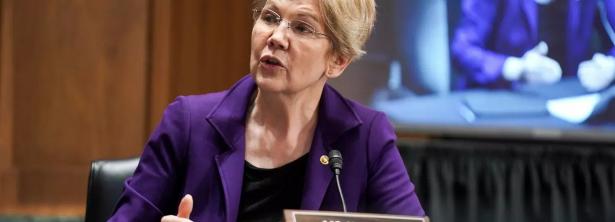US Senate Budget Committee Chair Bernie Sanders revealed Tuesday that Sen. Elizabeth Warren will testify this week at the panel's hearing on "Wall Street greed and growing oligarchy in America."
The Massachusetts Democrat, a former bankruptcy law professor, joins four other previously announced witnesses: Cecil Roberts, international president of the United Mine Workers of America (UMWA); Braxton Wright, a Warrior Met Coal employee and member of UMWA Local 2368; economist Nomi Prins; and University of Connecticut law professor James Kwak.
The Thursday morning hearing organized by Sanders (I-Vt.)—titled "Warrior Met and Wall Street Greed: What Corporate Raiders are Doing to Workers and Consumers"—will use the fossil fuel company and its striking workers as a case study.
Warrior Met Coal employees affiliated with UMWA have been on strike in Alabama for 11 months, fighting for better benefits, pay, and working conditions.
Sanders and Warren joined with Sen. Tammy Baldwin (D-Wis.) for November letters to the private equity firms that they said "made off like bandits" after taking over Warrior Met, at the expense of workers.
The trio also sent a letter to BlackRock—the world's largest asset manager–last month, calling on the firm to publicly pressure Warrior Met to "negotiate in good faith and agree to a reasonable contract that treats workers with dignity and respect."
As Sanders' office explained in a statement about the upcoming hearing:
In examining the effect of concentration of ownership on the U.S. economy and predatory tactics used by Wall Street firms that put workers and consumers at risk, the Budget Committee hearing will focus on the example of Warrior Met Coal, of which BlackRock is the largest owner and which was purchased by a group of private equity firms led by Blackstone and Apollo in 2016. Workers at the mines have been on strike for nearly a year. When the company faced bankruptcy in 2016, the miners at Warrior Met agreed to an across-the-board wage cut of 20%, and substantial reductions in their healthcare and retirement benefits as part of a restructuring deal made by the private equity firms. The sacrifices made by the miners saved the company an estimated $1.1 billion over the past five years. Meanwhile, since 2017, Warrior Met has rewarded over $1.5 billion in dividends to its wealthy shareholders while paying its CEO over $4 million per year.
Yet, now that the company has returned to profitability and has seen its stock price skyrocket by 250% during the pandemic, Warrior Met has offered its workers an insulting $1.50 raise over five years and has refused to restore the healthcare and pension benefits that were taken away from them five years ago. Outrageously and unacceptably, the company has also demanded the power to fire workers who engage in their constitutional right to strike and give seniority to new hires, rather than miners who have given their adult lives to Warrior Met.
The CEOs of Apollo, BlackRock, and Blackstone all declined Sanders' invitation to testify at the 11:00 am hearing.
The chairman, in his statement previewing the event, highlighted that BlackRock, State Street, and Vanguard—the "Big Three" asset managers—are the largest shareholders in over 85% of S&P 500 companies, and they each have "great power over executive compensation, climate commitments, share buyback proposals, mergers and acquisitions, and other advisory topics."
Sanders also noted that nationwide, "private equity firms or hedge funds own half of all daily newspapers, have invested over $800 billion in fossil fuels over the last decade, and control over 8,000 U.S. companies that employ more than 12 million Americans."
"However, the industry's overreliance on debt-finance buyouts leave Americans paying the price," he added, "while huge Wall Street firms walk away with exorbitant profits."


Spread the word